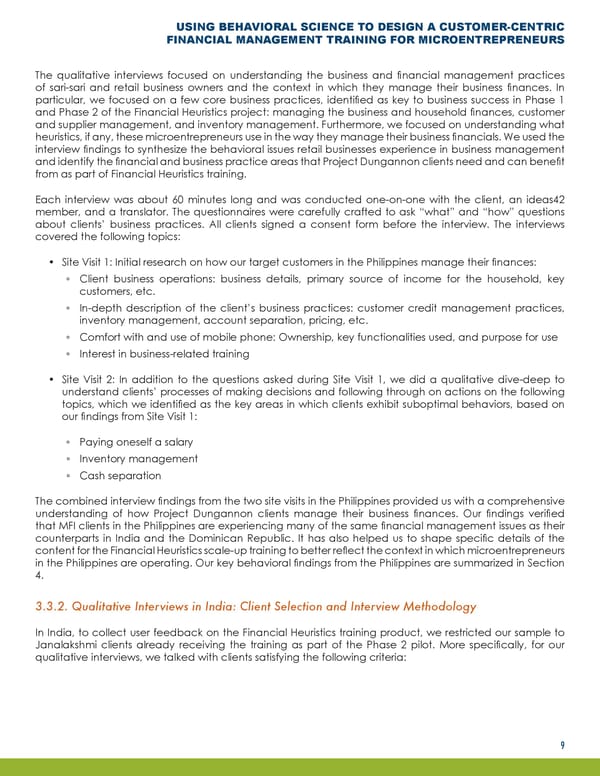USING BEHAVIORAL SCIENCE TO DESIGN A CUSTOMER-CENTRIC FINANCIAL MANAGEMENT TRAINING FOR MICROENTREPRENEURS The qualitative interviews focused on understanding the business and financial management practices of sari-sari and retail business owners and the context in which they manage their business finances. In particular, we focused on a few core business practices, identified as key to business success in Phase 1 and Phase 2 of the Financial Heuristics project: managing the business and household finances, customer and supplier management, and inventory management. Furthermore, we focused on understanding what heuristics, if any, these microentrepreneurs use in the way they manage their business financials. We used the interview findings to synthesize the behavioral issues retail businesses experience in business management and identify the financial and business practice areas that Project Dungannon clients need and can benefit from as part of Financial Heuristics training. Each interview was about 60 minutes long and was conducted one-on-one with the client, an ideas42 member, and a translator. The questionnaires were carefully crafted to ask “what” and “how” questions about clients’ business practices. All clients signed a consent form before the interview. The interviews covered the following topics: • Site Visit 1: Initial research on how our target customers in the Philippines manage their finances: ▫ Client business operations: business details, primary source of income for the household, key customers, etc. ▫ In-depth description of the client’s business practices: customer credit management practices, inventory management, account separation, pricing, etc. ▫ Comfort with and use of mobile phone: Ownership, key functionalities used, and purpose for use ▫ Interest in business-related training • Site Visit 2: In addition to the questions asked during Site Visit 1, we did a qualitative dive-deep to understand clients’ processes of making decisions and following through on actions on the following topics, which we identified as the key areas in which clients exhibit suboptimal behaviors, based on our findings from Site Visit 1: ▫ Paying oneself a salary ▫ Inventory management ▫ Cash separation The combined interview findings from the two site visits in the Philippines provided us with a comprehensive understanding of how Project Dungannon clients manage their business finances. Our findings verified that MFI clients in the Philippines are experiencing many of the same financial management issues as their counterparts in India and the Dominican Republic. It has also helped us to shape specific details of the content for the Financial Heuristics scale-up training to better reflect the context in which microentrepreneurs in the Philippines are operating. Our key behavioral findings from the Philippines are summarized in Section 4. 3.3.2. Qualitative Interviews in India: Client Selection and Interview Methodology In India, to collect user feedback on the Financial Heuristics training product, we restricted our sample to Janalakshmi clients already receiving the training as part of the Phase 2 pilot. More specifically, for our qualitative interviews, we talked with clients satisfying the following criteria: 9
 Using Behavioral Science to Design a Customer-Centric Financial Management Training for Microentrepreneurs Page 11 Page 13
Using Behavioral Science to Design a Customer-Centric Financial Management Training for Microentrepreneurs Page 11 Page 13